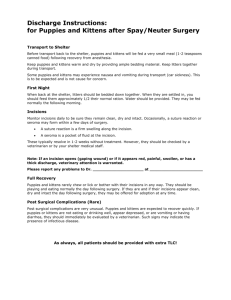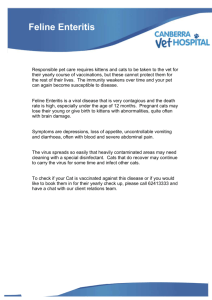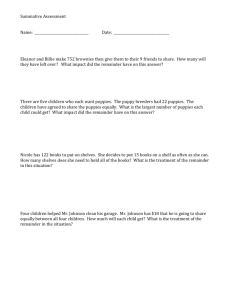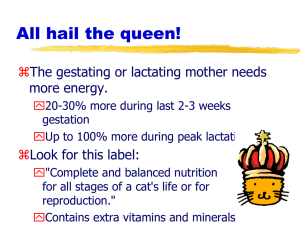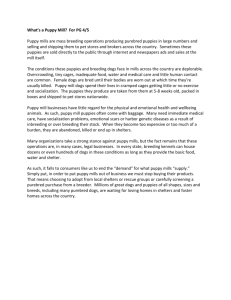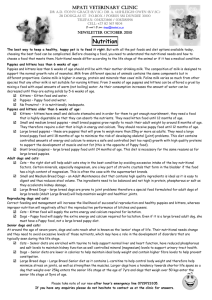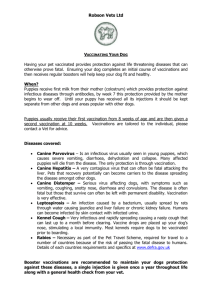disease_caused_by_e._coli
advertisement
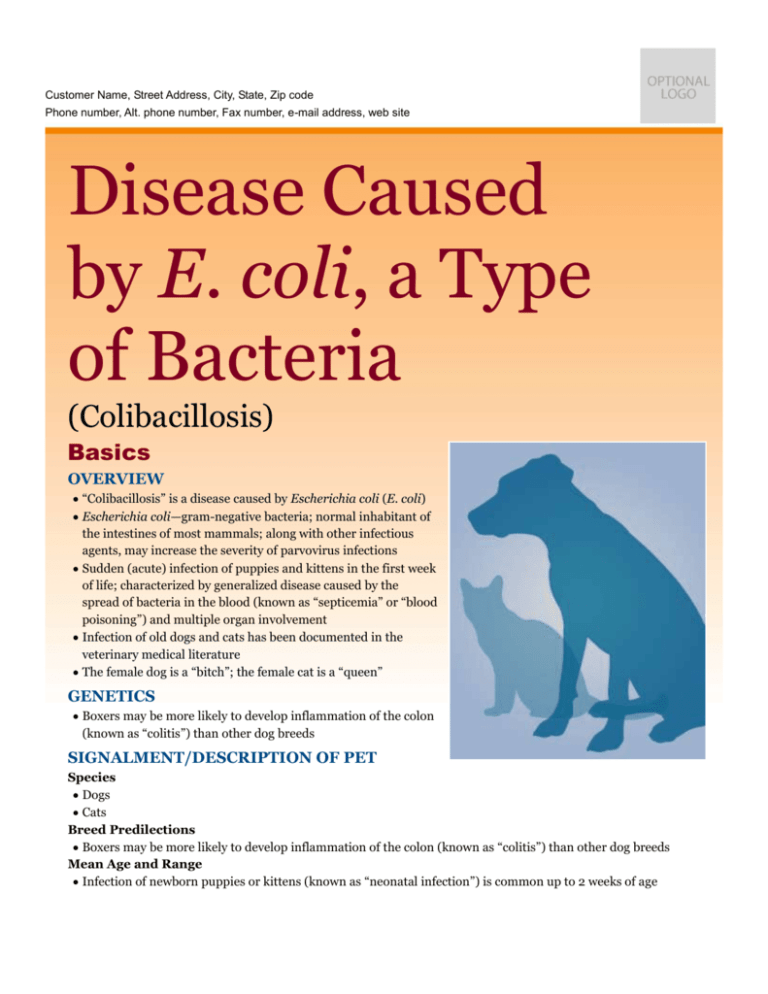
Customer Name, Street Address, City, State, Zip code Phone number, Alt. phone number, Fax number, e-mail address, web site Disease Caused by E. coli, a Type of Bacteria (Colibacillosis) Basics OVERVIEW • “Colibacillosis” is a disease caused by Escherichia coli (E. coli) • Escherichia coli—gram-negative bacteria; normal inhabitant of the intestines of most mammals; along with other infectious agents, may increase the severity of parvovirus infections • Sudden (acute) infection of puppies and kittens in the first week of life; characterized by generalized disease caused by the spread of bacteria in the blood (known as “septicemia” or “blood poisoning”) and multiple organ involvement • Infection of old dogs and cats has been documented in the veterinary medical literature • The female dog is a “bitch”; the female cat is a “queen” GENETICS • Boxers may be more likely to develop inflammation of the colon (known as “colitis”) than other dog breeds SIGNALMENT/DESCRIPTION OF PET Species • Dogs • Cats Breed Predilections • Boxers may be more likely to develop inflammation of the colon (known as “colitis”) than other dog breeds Mean Age and Range • Infection of newborn puppies or kittens (known as “neonatal infection”) is common up to 2 weeks of age • More common in newborn puppies and kittens less than 1 week of age, which have not received any or adequate amounts of colostrum (the first milk produced at the end of pregnancy that is rich in antibodies; “antibodies” are proteins that are produced by the immune system in response to a specific antigen—when the body is exposed to the antigen, the antibody responds; the “antigen” is any substance that induces an immune response; antigens include proteins, viruses, bacteria, and pollen) • E. coli (usually β-hemolytic)—major cause of generalized disease caused by the spread of bacteria in the blood (septicemia) in newborn puppies exposed while still in the uterus, during birth, or from milk of inflamed mammary glands (condition known as “mastitis”) • Puppies/kittens and adult dogs/cats—sporadic disease often associated with other infectious agents SIGNS/OBSERVED CHANGES IN THE PET • Newborns—sudden (acute) onset of depression, lack of appetite (known as “anorexia”), vomiting, rapid heart rate (known as “tachycardia”), weakness/lethargy, watery diarrhea, low body temperature (known as “hypothermia”), cold skin, bluish discoloration of the skin and moist tissues (mucous membranes) of the body caused by inadequate oxygen levels in the red-blood cells (known as “cyanosis”); one or more newborns affected in a litter; death • Puppies/kittens and adult dogs and cats—sudden (acute) vomiting, diarrhea, lack of appetite (anorexia), rapid dehydration, fever CAUSES • E. coli—one of the most common causes of generalized disease caused by the spread of bacteria in the blood (septicemia) and death in puppies and kittens • E. coli is a normal bacteria found in the adult's gastrointestinal tract, prepuce, and vagina • Often found in old dogs and cats at the same time as other infectious agents • A new type of E. coli has been found in boxers with inflammatory bowel disease; it has the ability to adhere and invade the intestinal wall, leading to a tremendous inflammatory response RISK FACTORS Newborns • Bitch/queen in poor health and nutritional status—unable to provide good care and colostrum (first milk) to offspring • Lack of colostrum (first milk) or insufficient colostrum • Dirty birthing environment • Difficult or prolonged labor and birth • Crowded facilities—buildup of feces in environment, greater chance for spread of infection Puppies/Kittens and Adult Dogs and Cats • Co-existent disease—parvovirus; heavy parasitism • Antibiotic treatment—alters normal bacteria of gastrointestinal tract • Inability to develop a normal immune response (known as “immunosuppression”) • Inflammation of the mammary glands or breasts of the bitch or queen following birth (known as “postparturient mastitis”) • Placement of an intravenous catheter Treatment HEALTH CARE • Suddenly (acutely) ill puppies/kittens—inpatients; good nursing care • Balanced fluids (such as lactated Ringer's solution) administered by injection—restore fluid balance • Glucose solution specifically designed for treatment of diarrhea, administered by mouth as required ACTIVITY • Suddenly (acutely) ill, immature puppies/kittens (that have bacteria in their blood [known as “bacteremia”] or have generalized disease caused by the spread of bacteria in the blood [septicemia])—restricted activity, cage rest, monitoring, and warmth DIET • Puppies—likely to be nursing when affected; good nursing care needed with bottle-feeding and/or intravenous nutrients Medications Medications presented in this section are intended to provide general information about possible treatment. The treatment for a particular condition may evolve as medical advances are made; therefore, the medications should not be considered as all inclusive • Antibiotic treatment for generalized disease caused by the spread of bacteria in the blood (septicemia)—guided by bacterial culture and sensitivity testing of E. coli; possible antibiotics include amikacin, cefazolin, cefoxitin, enrofloxacin, ticarcillin-clavulanate Follow-Up Care PATIENT MONITORING • Bacterial blood cultures—puppies/kittens with fever and/or diarrhea • Monitor temperature—with signs of sluggishness (lethargy) and/or depression • Monitor behavior—eating, drinking, and/or nursing; adequate weight gain PREVENTIONS AND AVOIDANCE • Bitch/queen—good health; vaccinated; good nutritional status • Clean and disinfect birthing environment, as directed by your pet's veterinarian; clean bedding after birth frequently • Ensure adequate colostrum (first milk) intake of all litter mates • Separate bitch/queen with nursing litter from other dogs or cats • Keep the number of dogs and cats low in kennel or cattery rooms, respectively • Wash hands and change clothes and shoes after handling other dogs/cats and before dealing with newborns POSSIBLE COMPLICATIONS • Death of puppies or kittens EXPECTED COURSE AND PROGNOSIS • Newborns—life-threatening disease; prognosis often poor; newborn may succumb rapidly; quick treatment with supportive care essential for survival • Adults—self-limiting disease with supportive care, depending on the degree of dehydration and existence of other diseases Key Points • Newborns—life-threatening disease with poor prognosis Enter notes here Blackwell's Five-Minute Veterinary Consult: Canine and Feline, Fifth Edition, Larry P. Tilley and Francis W.K. Smith, Jr. © 2011 John Wiley & Sons, Inc.
